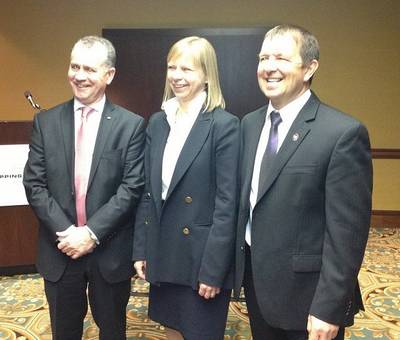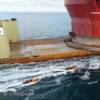In Big Ship Fuel Economy, Finances Trump Regulation
While increased regulation is often cited as the primary culprit driving shipowners to adopt new energy efficient technologies and practices for their ships, one major shipowner has a differing opinion.
“You can make the argument that regulations are what’s driving it, but personally I think it’s more economics,” said Chris Errington, Director of Engineering at Maersk Line. Errington, along with industry veteran Graham Westgarth, Executive Vice President of Operations and Stratefy, GasLog Logistics, was part of a panel discussion led by Dr. Kirsi Tikka, President and COO, ABS European Division, on energy efficiency of maritime vessels held on March 19, 2013 at the Connecticut Maritime Association’s Shipping 2013 event in Stamford, Connecticut.
“I think, even without the regulations, the shipyards and the economics of it are driven by the owners. The owners are the people that are demanding better designs and better efficiencies on the vessels.” Errington said, linking much of the industry’s focus on energy solutions to the “present financial climate and the economics of more energy efficient vessels.”
Given the market’s financial turbulence, squeezing fleets for the very last drop of profit has become a necessity for many shipowners. Vessel efficiency and company profits often go hand in hand, forcing shipowners to set their sights on energy solutions as an approach toward fleet-wide savings.
“[Maersk] has targets every year. Last year the target was $40 million in fuel savings, and we exceeded that. I think it was $78 million. We actually doubled it. And in the U.S. we achieved $16.7 million of that cost,” Errington said. “At the end of the day, everything is going to equate in dollar values. We’ll continue to challenge ourselves each year as we go. This year it’s a similar challenge of $80 million globally.”
But these savings are not achieved without careful consideration and attention to detail. Even seemingly small features such as marine coatings can draw big savings, Errington said. “Paint systems play a huge factor in your economies,” he noted. “We found that you can have huge savings by having the right paint system on a vessel. At Maersk in the last two years, we have taken six of our vessels out of the water, not when they were due but drydocked them early just to change the paint system. And we could see the paybacks virtually immediately.”
Echoing Errington’s view on economic-driven energy advancements, Westgarth said, “Because of the price of fuel and the pressure the industry’s under, I’m seeing more innovation than I ever have before. There’s different hull designs, there’s retrofits, there’s different engines, there’s a lot of focus on using LNG as a marine fuel on ships outside of the LNG business. In 10 year’s time I think we will look back and see a quantum leap.” Speaking to the economy’s impact on future design, he added, “The new generation of ships, in my view, are going to be at least 10-15% more efficient than anything that we actually see right now.”
Westgarth also referred to regulation as a driving force for proactive energy efficiency initiatives—still not without strong economic implications. “One way or another, there will eventually be a tax on greenhouse gas emissions, whether it is a levy or a tax, there will be some form of cost associate,” Westgarth said. “The legislation will come, and I think if you’re a responsible company it makes a lot of sense to have the systems and processes in place before the legislation so you’re not scrambling at the last minute.”
Both Maersk and GasLog along with many other companies have used ABS framework to adopt efficient best-practices for their respective fleets, but certainly not without consideration to their company’s financial interests.
Regulations provide benchmarks which help keep shipowners on track; but the economy is ultimately shining the spotlight on energy solutions and catalyzing industry efforts toward efficiency.















